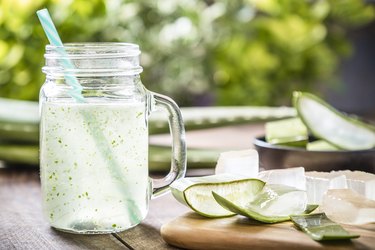
Aloe vera may be best known for its role in soothing your sunburn pain and skin inflammation, but this healing and succulent plant may also play a role in lowering blood sugar levels. If you have diabetes or prediabetes, you may want to give this juice a careful look.
With diabetes, your body cannot make or properly use the hormone insulin. When insulin can't move blood sugar to your cells for energy, blood sugar builds up — over time, your risk for diabetes-related complications including vision problems, kidney damage and heart disease rises, according to the National Institute of Diabetes and Digestive and Kidney Diseases.
Video of the Day
Video of the Day
It's the clear gel and yellow liquid "latex" from the aloe vera plant that may be responsible for its purported medicinal properties, commonly used in health products such as gels, juices and pills, notes the National Center for Complementary and Integrative Health (NCCIH). And, on the nutrition side, it's relatively low in sugar compared to other juices, according to the USDA.
Read more: What Are the Benefits of Aloe Vera Water?
A Possible Plus for Diabetes
It's possible that aloe vera juice or other oral forms of aloe may help reduce blood sugar levels, according to a meta-analysis of nine studies in the June 2016 issue of the Journal of Alternative and Complementary Medicine. It found that people with diabetes and prediabetes who consumed aloe vera juice, aloe gel capsules or dried aloe showed reductions in their fasting blood sugar levels and their HbA1c.
(HbA1c, or A1c for short, is a measure that provides a snapshot of average blood sugar levels over the past three months, says the U.S. Centers for Disease Control and Prevention (CDC). Prediabetes means your blood sugar levels are higher than they should be, but not quite high enough to be diagnosed as type 2 diabetes, per the CDC.)
More specifically, the analysis found that fasting blood sugar levels fell by 46.6 milligrams per deciliter (mg/dL) and HbA1c declined by 1.05 percent overall. The studies included in the analysis spanned four to 14 weeks — and the benefits were most pronounced among individuals who had a fasting blood sugar level of at least 200 milligrams per deciliter. The Mayo Clinic points out that a fasting blood sugar level of less than 100 is normal.
Exactly how aloe vera exerts a positive effect on blood sugar isn't fully understood, and the researchers note that more studies are needed to better understand how, and if, the more than 75 active compounds in aloe play a role.
However, caution is warranted when it comes to choosing products. Whole-leaf extracts and juices that have not been "decolorized" have shown evidence of cancer activity in animal studies, according to NCCIH.
Aloe for Diabetes: Not So Fast
Not everyone is convinced that aloe vera can help treat or prevent diabetes. "Despite this promising study, I cannot recommend consuming aloe vera because it is linked to diarrhea, low potassium and kidney failure," says Julie Cunningham, RDN, CDE, a dietitian/nutritionist and diabetes educator in Hendersonville, North Carolina. Aloe latex is sometimes used as a laxative to treat constipation, NCCIH notes.
People with diabetes are already at risk for kidney complications, Cunningham notes. "High blood sugar causes damage to the smallest blood vessels, which can be found in the eyes, the kidneys and the extremities, like the fingers and toes," she explains. "Given that many people with diabetes already have some degree of kidney impairment, it's especially important that they avoid consuming any substances that might do further damage to their kidneys."
Another caveat: Due to potential risks of diarrhea, aloe may reduce the absorption of some drugs, the NCCIH notes. And, if you have diabetes and are taking glucose-lowering medications and take aloe, it may lower blood glucose levels too much.
More Than Blood Sugar Control
Other potential uses for aloe may include treating osteoarthritis, the wear-and-tear form of the disease, as well as bowel diseases and fever reduction, NCCIH notes.
Maria E. Pena, MD, an assistant professor at the Icahn School of Medicine and director of endocrine services at Mount Sinai Doctors in Forest Hills, New York, says aloe vera has many other benefits. "It can help with digestion and the immune system, and some studies suggest antiviral and antitumor properties. It's also great for skin and hair as a moisturizer and for hair growth. It can also help with wound healing."
However, always make sure that you talk with your doctor or diabetes educator before starting to take any new supplements, Dr. Pena adds.
- National Institute of Diabetes and Digestive and Kidney Diseases: “What Is Diabetes?”
- National Center for Complementary and Integrative Health: “Aloe Vera”
- Journal of Alternative and Complementary Medicine: “Reduction of Fasting Blood Glucose and Hemoglobin A1c Using Oral Aloe Vera: A Meta-Analysis”
- CDC: “Prediabetes - Your Chance to Prevent Type 2 Diabetes”
- Mayo Clinic: “Diabetes”
- Maria E. Pena, MD, assistant professor, Icahn School of Medicine, director of endocrine services, Mount Sinai Doctors, Forest Hills, New York
- USDA: “Aloe Vera Juice Drink Fortified With Vitamin C”
- Julie Cunningham, MPH, RDN, LDN, CDE, IBCLC, dietitian, certified diabetes educator, Hendersonville, North Carolina
- U.S. Centers for Disease Control and Prevention: "All About Your A1C"
Is this an emergency? If you are experiencing serious medical symptoms, please see the National Library of Medicine’s list of signs you need emergency medical attention or call 911.